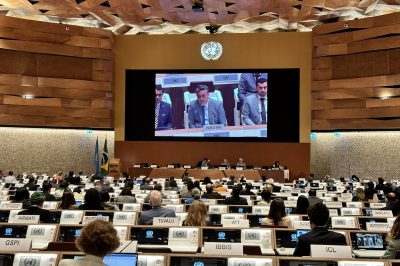Geneva, 10 August 2023 (WAI): Ambassador Khalil Hashmi of Pakistan at the United Nations presented his nation’s groundbreaking Working Paper at the Working Group on Strengthening the Biological Weapons Convention (BWC) in Geneva, marking a critical step towards boosting global security and supporting the peaceful use of life sciences.
The Working Paper highlighted Pakistan’s comprehensive and advanced approach to ICA, a critical component of the Biological Weapons Convention. This significant proposal presents a concrete framework for implementing the ICA mechanism, focusing on organizational structure and financial arrangements.
Pakistan’s concept centers on creating a revolutionary triangular institutional structure emphasizing cooperation and effectiveness. The structure comprises three major components: an International Cooperation and Assistance (ICA) program, a dedicated Committee, and a voluntary Fund.
The system, created to promote collaboration and information sharing across nations, is built around the ICA program. It anticipates collaborative efforts to harness the potential of biological sciences for peaceful ends while discouraging any misuse of harmful intent. The proposed Committee will provide strategic supervision and advice, ensuring that projects done via the mechanism are consistent with the values and goals of the Convention.
The optional Fund, which intends to raise financial resources from member states to implement ICA projects effectively, is a fundamental novelty in Pakistan’s plan. This Fund embodies a concrete commitment to global security and shows a shared commitment to preventing the exploitation of life sciences.
Also Read: Revitalizing Pakistan’s Economy: The Vital Role of Diplomatic Ties with Central Asia
Ambassador Khalil Hashmi stated, “Pakistan’s Working Paper is not just a proposal; it’s a pragmatic roadmap to transform the standards of the Biological Weapons Convention into actionable, impactful projects. Our mission is based on cooperation, transparency, and shared responsibility for the peaceful growth of life sciences.”
The Working Paper is well received by member states, many of which praise its forward-thinking and inclusive approach. Pakistan’s approach opens the door for effective and flexible global partnerships as the world grapples with changing biosecurity concerns.
The Working Paper’s release signifies Pakistan’s dedication to preserving international stability and advancing the peaceful application of life sciences. Pakistan remains committed to working cooperatively with member nations to enhance and implement this revolutionary approach as discussions continue within the Working Group.
International Relations Scholar interested in National Security strategies, with a good focus on Geo-Politics, Foreign Policy, and Public & Cultural Diplomacy.








